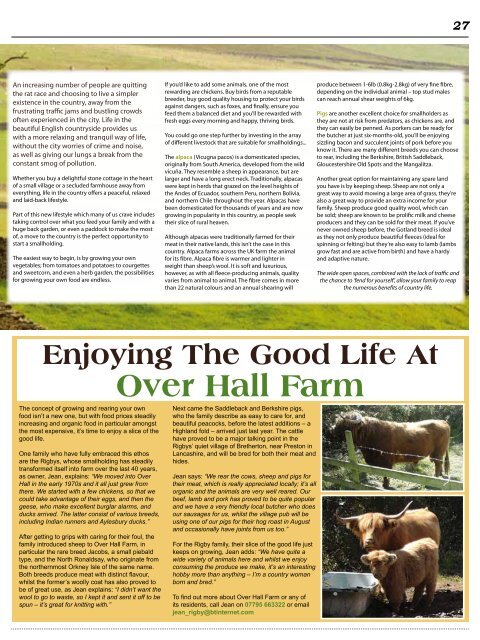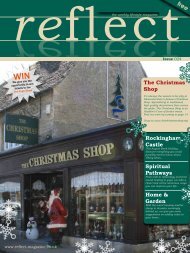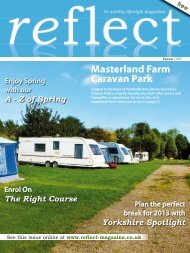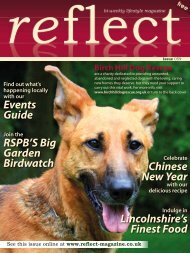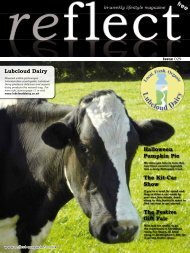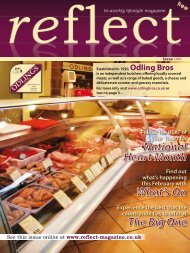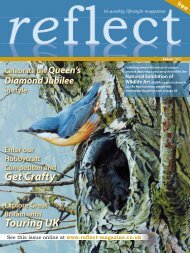Good Pub Guide Swadlincote Ski Centre and ... - Reflect Magazine
Good Pub Guide Swadlincote Ski Centre and ... - Reflect Magazine
Good Pub Guide Swadlincote Ski Centre and ... - Reflect Magazine
You also want an ePaper? Increase the reach of your titles
YUMPU automatically turns print PDFs into web optimized ePapers that Google loves.
27<br />
An increasing number of people are quitting<br />
the rat race <strong>and</strong> choosing to live a simpler<br />
existence in the country, away from the<br />
frustrating traffic jams <strong>and</strong> bustling crowds<br />
often experienced in the city. Life in the<br />
beautiful English countryside provides us<br />
with a more relaxing <strong>and</strong> tranquil way of life,<br />
without the city worries of crime <strong>and</strong> noise,<br />
as well as giving our lungs a break from the<br />
constant smog of pollution.<br />
Whether you buy a delightful stone cottage in the heart<br />
of a small village or a secluded farmhouse away from<br />
everything, life in the country offers a peaceful, relaxed<br />
<strong>and</strong> laid-back lifestyle.<br />
Part of this new lifestyle which many of us crave includes<br />
taking control over what you feed your family <strong>and</strong> with a<br />
huge back garden, or even a paddock to make the most<br />
of, a move to the country is the perfect opportunity to<br />
start a smallholding.<br />
The easiest way to begin, is by growing your own<br />
vegetables; from tomatoes <strong>and</strong> potatoes to courgettes<br />
<strong>and</strong> sweetcorn, <strong>and</strong> even a herb garden, the possibilities<br />
for growing your own food are endless.<br />
If you’d like to add some animals, one of the most<br />
rewarding are chickens. Buy birds from a reputable<br />
breeder, buy good quality housing to protect your birds<br />
against dangers, such as foxes, <strong>and</strong> finally, ensure you<br />
feed them a balanced diet <strong>and</strong> you’ll be rewarded with<br />
fresh eggs every morning <strong>and</strong> happy, thriving birds.<br />
You could go one step further by investing in the array<br />
of different livestock that are suitable for smallholdings...<br />
The alpaca (Vicugna pacos) is a domesticated species,<br />
originally from South America, developed from the wild<br />
vicuña. They resemble a sheep in appearance, but are<br />
larger <strong>and</strong> have a long erect neck. Traditionally, alpacas<br />
were kept in herds that grazed on the level heights of<br />
the Andes of Ecuador, southern Peru, northern Bolivia,<br />
<strong>and</strong> northern Chile throughout the year. Alpacas have<br />
been domesticated for thous<strong>and</strong>s of years <strong>and</strong> are now<br />
growing in popularity in this country, as people seek<br />
their slice of rural heaven.<br />
Although alpacas were traditionally farmed for their<br />
meat in their native l<strong>and</strong>s, this isn’t the case in this<br />
country. Alpaca farms across the UK farm the animal<br />
for its fibre. Alpaca fibre is warmer <strong>and</strong> lighter in<br />
weight than sheep’s wool. It is soft <strong>and</strong> luxurious,<br />
however, as with all fleece-producing animals, quality<br />
varies from animal to animal. The fibre comes in more<br />
than 22 natural colours <strong>and</strong> an annual shearing will<br />
produce between 1-6lb (0.8kg-2.8kg) of very fine fibre,<br />
depending on the individual animal – top stud males<br />
can reach annual shear weights of 6kg.<br />
Pigs are another excellent choice for smallholders as<br />
they are not at risk from predators, as chickens are, <strong>and</strong><br />
they can easily be penned. As porkers can be ready for<br />
the butcher at just six-months-old, you’ll be enjoying<br />
sizzling bacon <strong>and</strong> succulent joints of pork before you<br />
know it. There are many different breeds you can choose<br />
to rear, including the Berkshire, British Saddleback,<br />
Gloucestershire Old Spots <strong>and</strong> the Mangalitza.<br />
Another great option for maintaining any spare l<strong>and</strong><br />
you have is by keeping sheep. Sheep are not only a<br />
great way to avoid mowing a large area of grass, they’re<br />
also a great way to provide an extra income for your<br />
family. Sheep produce good quality wool, which can<br />
be sold; sheep are known to be prolific milk <strong>and</strong> cheese<br />
producers <strong>and</strong> they can be sold for their meat. If you’ve<br />
never owned sheep before, the Gotl<strong>and</strong> breed is ideal<br />
as they not only produce beautiful fleeces (ideal for<br />
spinning or felting) but they’re also easy to lamb (lambs<br />
grow fast <strong>and</strong> are active from birth) <strong>and</strong> have a hardy<br />
<strong>and</strong> adaptive nature.<br />
The wide open spaces, combined with the lack of traffic <strong>and</strong><br />
the chance to ‘fend for yourself’, allow your family to reap<br />
the numerous benefits of country life.<br />
Enjoying The <strong>Good</strong> Life At<br />
Over Hall Farm<br />
The concept of growing <strong>and</strong> rearing your own<br />
food isn’t a new one, but with food prices steadily<br />
increasing <strong>and</strong> organic food in particular amongst<br />
the most expensive, it’s time to enjoy a slice of the<br />
good life.<br />
One family who have fully embraced this ethos<br />
are the Rigbys, whose smallholding has steadily<br />
transformed itself into farm over the last 40 years,<br />
as owner, Jean, explains: “We moved into Over<br />
Hall in the early 1970s <strong>and</strong> it all just grew from<br />
there. We started with a few chickens, so that we<br />
could take advantage of their eggs, <strong>and</strong> then the<br />
geese, who make excellent burglar alarms, <strong>and</strong><br />
ducks arrived. The latter consist of various breeds,<br />
including Indian runners <strong>and</strong> Aylesbury ducks.”<br />
After getting to grips with caring for their foul, the<br />
family introduced sheep to Over Hall Farm, in<br />
particular the rare breed Jacobs, a small piebald<br />
type, <strong>and</strong> the North Ronaldsay, who originate from<br />
the northernmost Orkney Isle of the same name.<br />
Both breeds produce meat with distinct flavour,<br />
whilst the former’s woolly coat has also proved to<br />
be of great use, as Jean explains: “I didn’t want the<br />
wool to go to waste, so I kept it <strong>and</strong> sent it off to be<br />
spun – it’s great for knitting with.”<br />
Next came the Saddleback <strong>and</strong> Berkshire pigs,<br />
who the family describe as easy to care for, <strong>and</strong><br />
beautiful peacocks, before the latest additions – a<br />
Highl<strong>and</strong> fold – arrived just last year. The cattle<br />
have proved to be a major talking point in the<br />
Rigbys’ quiet village of Bretherton, near Preston in<br />
Lancashire, <strong>and</strong> will be bred for both their meat <strong>and</strong><br />
hides.<br />
Jean says: “We rear the cows, sheep <strong>and</strong> pigs for<br />
their meat, which is really appreciated locally; it’s all<br />
organic <strong>and</strong> the animals are very well reared. Our<br />
beef, lamb <strong>and</strong> pork has proved to be quite popular<br />
<strong>and</strong> we have a very friendly local butcher who does<br />
our sausages for us, whilst the village pub will be<br />
using one of our pigs for their hog roast in August<br />
<strong>and</strong> occasionally have joints from us too.”<br />
For the Rigby family, their slice of the good life just<br />
keeps on growing, Jean adds: “We have quite a<br />
wide variety of animals here <strong>and</strong> whilst we enjoy<br />
consuming the produce we make, it’s an interesting<br />
hobby more than anything – I’m a country woman<br />
born <strong>and</strong> bred.”<br />
To find out more about Over Hall Farm or any of<br />
its residents, call Jean on 07795 663322 or email<br />
jean_rigby@btinternet.com


